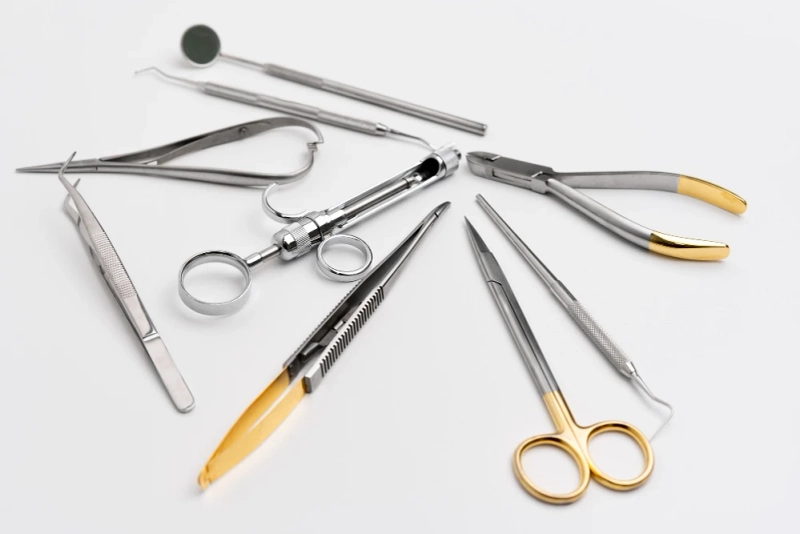Sterility, aseptic technique, and precision are essential for surgery.
The information about surgical instrument maintenance is necessary to enhance efficiency, effectiveness, and safety for medical professionals and students.
It is also essential to know the right medical tools, as the other half of the job is sterilizing or maintaining those tools.
This blog will focus on general surgical instruments, their usage, and the proper method to sterilize and store them.
What Are General Surgical Instruments?
General surgical instruments are essential during any operation and are used to dissect, incise, suture, or dress any wound.
Some of these medical tools are utilized in several kinds of surgical procedures, such as general surgery, orthopedic surgery, and gynecological surgery.
- For wound and incision suturing, surgeons use needle holders and suturing needles.
- For grasping and holding, forceps and clamps are needed.
- For cutting and dissecting purposes, tools like scalpels, scissors, and knives are used.
- Retracting and exposing tools like retractors are used to hold back tissue.
All these surgery instruments are very important in order to achieve optimal procedure outcomes and ensure the safety of the patients.
Key Considerations for Selecting General Surgical Instruments
It is essential that surgeons select appropriate general surgical instruments that enhance effective surgeries and reduce risks to patients.
All surgical instruments must meet high standards. However, several factors must be considered when deciding which instruments to use.
Here are some key considerations:
1. Material Quality
The efficiency and longevity of surgical instruments mainly depend on the kind of material used in their conception. German stainless steel is quite popular due to its:
- Capacity to maximize corrosion resistance
- Levels of durability
- Ease of sterilization
Titanium is also used in some cases with surgeries due to its:
- Sheer strength
- Lightness
- Exactness
It is preferred where fine and delicate instruments are needed.
2. User-friendly Design
Tools that have flexibility help overcome tiredness during extensive operations while the control is improved. Easy to grip and positively functioning mechanisms add to control.
It means that the corresponding medical tools should have readily manipulable properties while maintaining accuracy that does not create stress in the hand.
3. Instrument Longevity
When buying general surgical instruments, look at their durability. Fixed instruments with rigid build and few parts that can wear out quickly can have longer life with proper care and sterilization
Ensure regular maintenance, including:
- Sharpening
- Lubricating
- Correct storage
These things make your instruments long-lasting.
4. Versatility
Using one instrument to perform several tasks helps speed up surgeries.
Of these, some tools are actually multifunctional in that, for instance, a needle holder is incorporated in the surgical scissors.
5. Precision and Performance
Instruments must deliver the precise performance expected in a sterile environment.
For example:
- Sharp scalpels allow for clean cuts.
- Forceps must have a reliable grip without damaging tissue.
Substandard equipment distorts the result of surgery; hence, ensure that you choose the instruments that are:
- Sharp
- Flawless
- Efficient
6. Sterilization Compatibility
Sterilization must also be considered in terms of how easy it is to accomplish. A tool that will fit best would be one that can be used in high-temperature sterilization procedures such as autoclave.
Complex tools should undergo a detailed examination to ensure the maintenance team can sanitize all instrument parts.
Best Practices for Sterilization of General Surgical Instruments
One of the basic steps in ensuring that surgical instruments last a long time is to sterilize them.
Poorly cleaned medical tools might cause severe infections or even complications during surgeries.
Below are the recommended steps for sterilizing surgical instruments:
Pre-cleaning
While sterilizing the instruments, wash them to remove the blood, body fluids, or tissue deposits beforehand.
When washing instruments, wash with warm water, a mild detergent, and a brush right after surgery.
- Rinse off contaminants.
- Ensure no residue remains in crevices.
- Scrub gently to remove the remaining debris.
Manual Cleaning
- Use a neutral pH-cleaning solution.
- Use a soft-bristled brush for fine instruments.
- Avoid abrasive materials that could damage the surgery instruments.
Ultrasonic Cleaning
In the case of complicated instruments, ultrasonic cleaning should be employed.
This method makes use of high-frequency sound waves to clean difficult-to-get areas of the medical instruments.
Sterilization Methods
Autoclaving
The most common and safe method is using steam under pressure to kill all microbes.
Dry Heat Sterilization
Suitable for instruments that can withstand high temperatures without any damage.
Ethylene Oxide (EO) Sterilization
This chemical compound is used as a solution that is ideal for sterilization of heat-sensitive surgery tools.
Post-Sterilization Care
After surgical operation, the instruments should be sterilized and put in a clean, dry, sterile place.
Make sure that the instruments are labeled correctly to avoid confusion during surgeries.
Maintaining General Surgical Instruments for Longevity
The maintenance of general surgical instruments involves thorough cleaning and sterilization in order to have accurate results and durability.
Besides, a maintained instrument doesn't need to be replaced so often, while in its worst state, its effectiveness is compromised.
- Inspect for damage – Check for wear and tear, corrosion, or any other signs of damage.
- Lubricate moving parts – This prevents stiffness in surgery tools like scissors and forceps.
- Sharpen blades regularly – Blunt scalpels or scissors can hinder surgery efficiency.
- Proper storage – Always store instruments in a dry, sterilized environment to avoid rust and bacterial growth.
Adhering to the best practices formulated herein ensures the general surgical instruments last long, enhancing safety during operations and making the surgeries more efficient.
The Importance of Using High-Quality Surgery Tools
As we all know, healthcare practitioners have no choices regarding the use of high-quality surgical instruments.
The use of substandard instruments results in procedural errors such as inefficiency in surgery time and inappropriate patient safety.
Investing in reliable, durable surgery tools can:
- Improve surgical precision.
- Reduce the risk of infection.
- Ensure better patient outcomes.
- Extend the lifespan of the instruments.
It is important to emphasize that when choosing general surgical instruments, it is necessary to focus on those manufacturers that can provide instruments that meet high-quality requirements.
Graph: Sterilization Efficiency of Different Methods
This graph represents the efficiency of each kind of sterilization to emphasize the autoclave technique is safe for most surgical instruments.
Conclusion
All medical professionals must maintain and sterilize general surgical instruments to enhance the success rate of operations and patients’ comfort.
When it comes to sterilization and maintenance procedures, healthcare professionals should prefer the best method for their equipment.
GerMedUSA offers top-quality, durable surgical instruments designed to meet the demands of modern medical practices.
Their instruments are crafted precisely and undergo rigorous quality checks to meet the highest standards.
Visit and explore their catalog to enjoy discounted prices on general surgical instruments!
FAQs
How often should surgical instruments be sterilized?
Surgery equipment should be cleaned after every use to ensure they don’t catch any infectious material and transfer them to patients.
Can all surgical instruments be autoclaved?
Some of the instruments used in operations cannot be subjected to the extremely high temperatures associated with autoclaving. Heat-sensitive tools should undergo other forms of sterilization, such as Ethylene Oxide (EO) sterilization.


